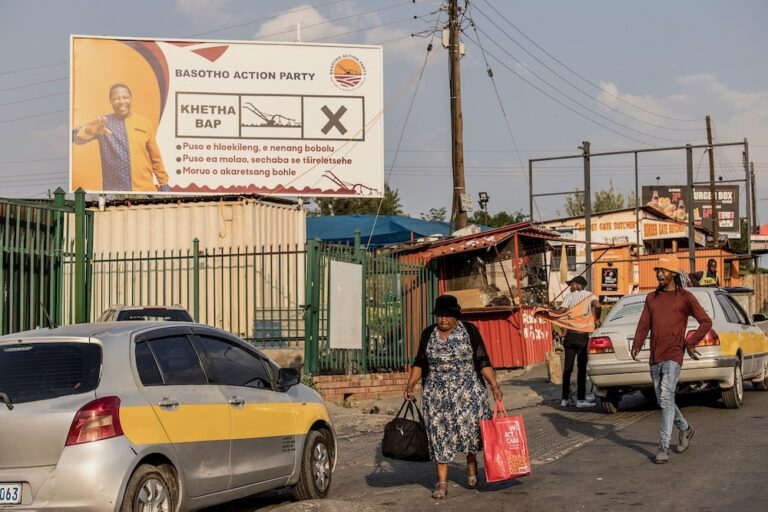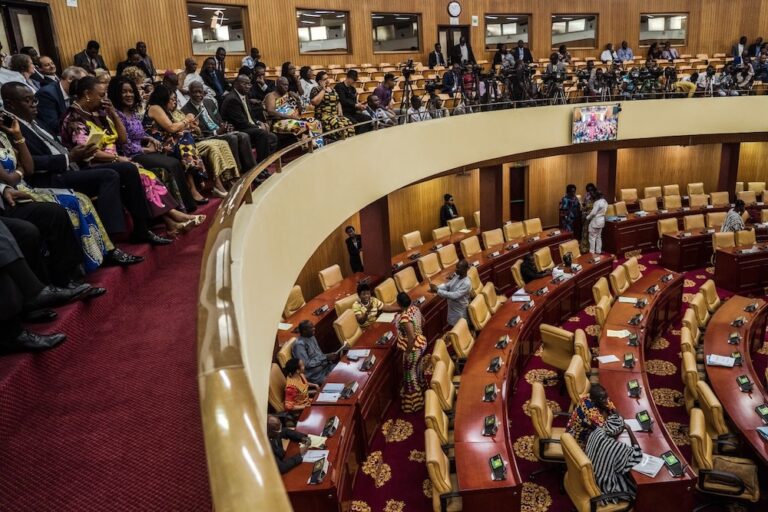(MISA/IFEX) – “The Namibian” newspaper editor Gwen Lister was named winner of the 1997 Press Freedom Award of the Media Institute of Southern Africa (MISA). MISA Deputy Regional Chairperson Phasha Mayisela announced the winner at a gala dinner held on 8 October 1997 at the close of a three day MISA conference and annual general […]
(MISA/IFEX) – “The Namibian” newspaper editor Gwen Lister was
named winner of the 1997 Press Freedom Award of the Media
Institute of Southern Africa (MISA). MISA Deputy Regional
Chairperson Phasha Mayisela announced the winner at a gala dinner
held on 8 October 1997 at the close of a three day MISA
conference and annual general meeting in Victoria Falls Town,
Zimbabwe.
Lister accepted the award before an audience which included
Zimbabwe’s independent and only female member of Parliament,
Margaret Dongo, and a representative of the government of
Zimbabwe President Robert Mugabe, Information Director Bornwell
Chakawadza.
Lister said that, in 1990, the struggles of her people won
Namibia its political independence, but that this “did not
automatically” guarantee democracy. “Most of our journalists
worked hard and courageously, but it’s the second liberation
(democratic governance) which is more difficult,” she said,
because “you are working with the people you helped and fought to
get to power but who now regard you as an enemy, because you
criticise them.”
She cautioned that, like democracy, press freedom is very fragile
in southern Africa. It must be nurtured and worked for. The media
should also be open for criticism.
“I accept this award paying tribute to where it belongs,” she
said in reference to her supportive staff at “The Namibian”.
The MISA press freedom award is given annually to individuals in
the region who have distinguished themselves in the fight for
media freedom in southern Africa. Previous winners include
Basildon Peta of Zimbabwe, Fred M’membe of Zambia and Alister
Sparks of South Africa.
The citation for MISA’s 1997 Press Freedom Award is appended to
the end of this press release.
Citation for MISA’s Press Freedom Award: Victoria Falls, Zimbabwe
—————————————————————–
The winner of MISA’s 1997 award for Press Freedom is being
honoured for her unfailing commitment to a free and independent
media over the past year as demonstrated by the numerous
editorials and news articles in her newspaper exposing and
criticising the Government in her country for its lack of
transparency and open governance. This commitment is all the
more remarkable given this person’s international reputation in
the year’s preceding her country’s independence, for appearing to
be closely aligned to the liberation movement which is now the
ruling party. We are proud and honoured to announce to you this
evening that this year’s winner of MISA’s Press Freedom Award, is
the Editor of The Namibian Newspaper, Ms Gwen Lister.
Ms Lister promoted United Nations Resolution 435 as the only
viable solution for bringing about the independence of Namibia.
This plan was regarded by pro-status quo elements as ‘Swapo’s
plan.’ The South West African People’s Organisation (SWAPO) is
the ruling party in Namibia today. Even in those years she
vigorously denied the allegation of alignment, stating that her
newspaper supported the UN resolution and was not affiliated to
any political grouping. She is quoted as saying in 1989 in an
article published by the international Press Institute, that ‘the
same will apply after independence, as the paper will remain
committed to the maintenance of a free press and the upholding of
human rights.’ Ms Lister remained true to her word.
Her newspaper career in Namibia over the past 22 years is
testimony to her determination to publish an independent
newspaper despite an extraordinary history of extreme harassment.
During her first six years as a political reporter on the
Windhoek Observer she incurred the wrath of the South African
authorities – the former administration in Namibia – who raided
her home and acquitted her under various laws including the
Internal Security Act, the Publications Act and the Customs and
Excise Act, for alleged possession of banned documents. In 1984
this newspaper was banned as a consequence of her political
reporting. Although she raised funds from abroad and successfully
challenged the ban before the Publications Appeal Board in
Pretoria, she was fired by the newspaper. This precipitated the
walk-out of the entire staff resulting in their dismissal.
She immediately began making plans to launch a new newspaper and
during the same year was arrested under the Official Secrets Act
for publishing a document sent to her in error. It contained
authorisation from the chief of Security Police in South Africa
for the interception of all her incoming and outgoing mail. For
some time after her release, she was restricted to the Windhoek
district. Her passport was confiscated and she had to report to
the police three times a week. Charges against her were
subsequently dropped.
Ms Lister and her fired colleagues eventually succeeded in
launching The Namibian on August 20 1985. The authorities
imposed a registration fee on the newspaper of R20 000 on the
grounds that it posed a threat to the security of the state. She
successfully challenged the fee in court and the deposit was
returned to the newspaper.
The Namibian then became the target of right wing elements in the
security forces. These attacks culminated in the burning down of
the offices of the Namibian in October 1988 by a group calling
themselves ‘The White Wolves’. There were numerous other attacks
including bullets regularly being fired through windows, tear gas
being placed in the air conditioning system, the confiscation of
many editions of the newspaper in the northern parts of the
country, advertising boycotts by the white business community at
the insistence of the South African authorities, the denial of
passports to Ms Lister and other staff members as well as death
threats.
She was detained for several days in June 1988 while four months
pregnant, under a proclamation which provided for detention
without trial and without access to a lawyer. During this time
she was pressurised to disclose the source of a document she had
published which provided sweeping new powers for the police in
the country and a state of emergency. She was released after
international protests on her behalf.
After Namibian independence in March 1990 the newspaper was again
targeted by right wing elements after Ms Lister published a
report about a possible coup attempt. The Namibian offices were
devastated in a fire bombing. In another case, a collaborator of
the notorious Civil Co-operation Bureau of the South African
Defense Force, Irish mercenary Donald Acheson, who was held in
Namibia for the murder of a SWAPO activist, revealed in 1991
that he had been sent to Namibia to ‘eliminate’ Ms Lister.
During this conference which is discussing the sustainability of
the independent media in Southern Africa, it is also worth noting
that The Namibian has successfully made the transition from
donor-funded newspaper to self-sufficiency. Ms Lister has also
ensured that young African journalists are trained at the
newspaper so that skills can be transferred to a new generation.
Another interesting feature is that Ms Lister is not the personal
owner of the Namibian and that she chose instead, to have it
established as a trust.
MISA is therefore proud to add its 1997 Press Freedom Award to
her list of previous awards including the 1988 IPS International
Journalism Award at the UN Headquarters in New York, the 1988
Pringle Award for Press Freedom of the Southern African Society
of Journalists as well as the 1991 International journalism award
of the Committee to Protect Journalists in New York.


